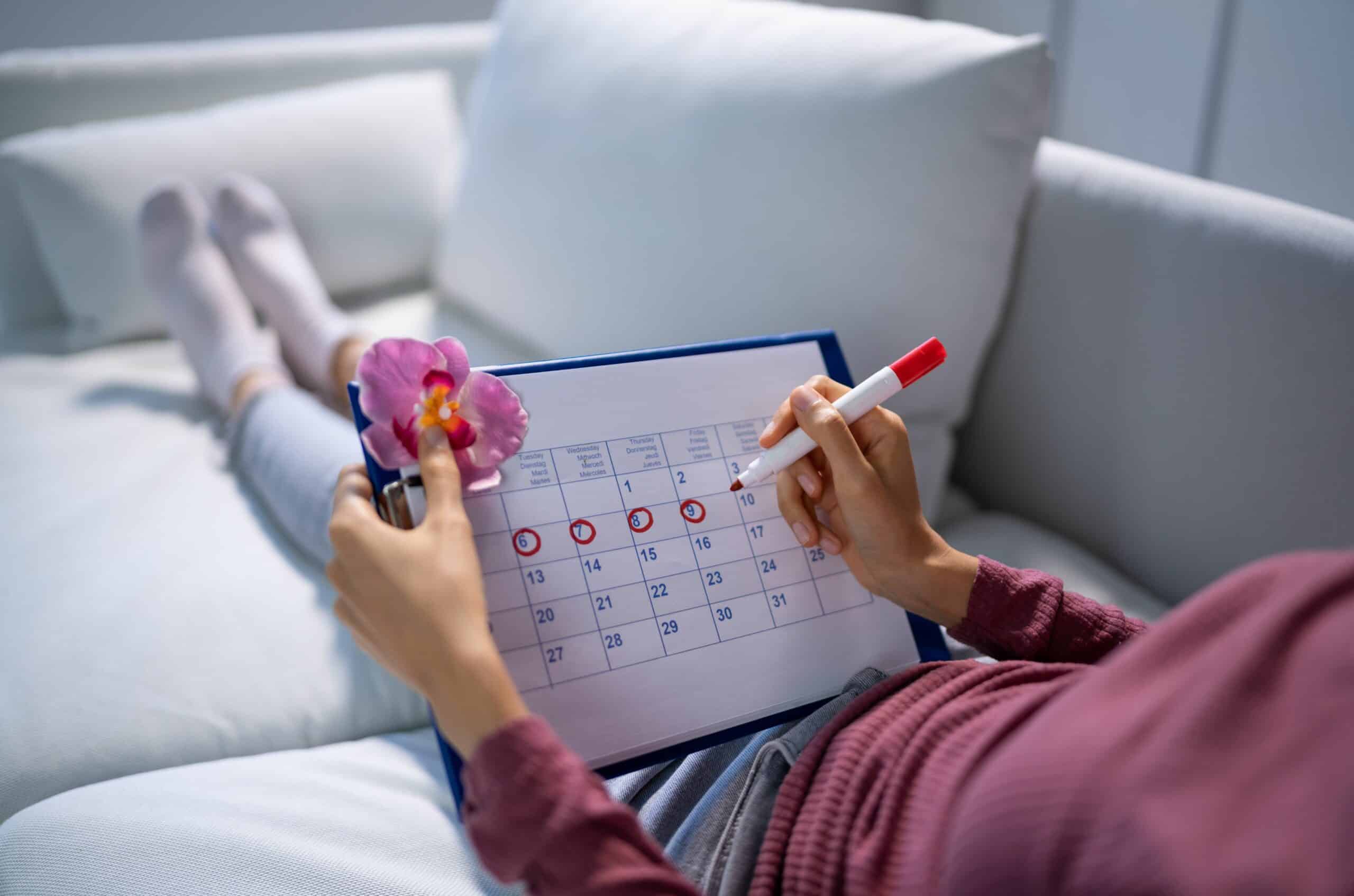
ormones are among the most important substances in our body. But what happens when they get out of balance and hormonal imbalances occur? And how can you support your hormone health in everyday life?
Whether it's your menstrual cycle, body temperature, water balance or metabolism: almost all processes in your body are controlled by hormones. And you don't even realise it. We already know about 100 different hormones - but it is assumed that there are hundreds more that ensure that everything in your body works as it should. However, if this system gets out of balance, it can have noticeable (physical) consequences.
Dr Katharina Maria Burkhardt, MSc is an author, supervisor, teacher and hormone researcher. Analysing our body's own hormones is therefore part of her everyday professional life. She is intensively involved with the hormonal (im)balances in our bodies and what we can actively do to support our hormone balance. We discussed with her some of the burning questions about our hormonal balance and how you can best stay in balance!
1) Which symptoms indicate hormonal imbalances?
Hormonal imbalances or a lack or excess of certain hormones can manifest themselves in very different symptoms. An irregular menstrual cycle, hot flushes or PMS in particular quickly make us think of a hormonal cause. "It's the symptoms that we wouldn't immediately attribute to a hormonal imbalance that often require the support of an expert," says Katharina Burkhardt. These include symptoms such as depression, osteoporosis, exhaustion or problems with the gastrointestinal tract. It is often difficult to find the exact cause, especially in the case of non-specific symptoms. So if you suspect a hormonal imbalance as the cause of your symptoms, you should consult your GP and then an endocrinologist or hormone specialist at an early stage. In advance, you can consult an Questionnaire create a basis for your medical consultation.
2) Why is my gut health important for my hormonal balance?
We now know that the gut is at the centre of our health. And that's not all: our gut health also influences our hormone balance and hormonal imbalances. For example, it is known that a healthy intestinal mucosa forms an important basis for the production of thyroid and adrenal hormones. However, this also means that the less diverse the microbiome in our intestinal mucosa is, the more problems it can cause. For example, it can be partly responsible for PCO syndrome and endometriosis. Conversely, an estriol deficiency, for example, can cause dry mucous membranes and thus favour inflammatory bowel diseases or irritable bowel syndrome.
3) How do hormonal PMS symptoms develop and what can I do about them?
Do you feel irritable, bloated and simply uncomfortable in your skin before your period? Then you could be suffering from PMS. Premenstrual symptoms are thought to be caused by a lack of progesterone or estrogen dominance. However, hormonal imbalances can possibly be alleviated with some tried and tested micronutrients and plants:
- Magnesium has an antispasmodic and relaxing effect.
- Vitamin B6 can have a mood-enhancing and analgesic effect.
- Vitamin D3 can inhibit inflammation and support your immune system.
- Lady's mantle, yarrow and monk's pepper have been proven to alleviate PMS symptoms in the second half of the cycle. You can take them in the form of tea or a tincture, for example.
You can also counteract your PMS symptoms with balancing sports such as yoga and an alkaline diet.

4) What natural approaches are there to alleviate hormonal symptoms in the female cycle?
It's not just PMS that can affect you during your cycle and cause hormonal imbalances. Other complaints can also be linked to hormonal imbalances. The good news is that you can naturally support your dominant hormones (estrogens and progesterone) in the respective cycle phase.
In the first half of the cycle herbs that promote estradiol production, such as red clover, lemon balm, black cohosh and rosemary. If you have symptoms of estradiol deficiency, you should eat more foods such as pulses (peas, beans, lentils, chickpeas), nuts (especially cashews and peanuts, but also almonds), fruit (apples, papaya) and various seeds (aniseed, flax, sesame) and berries. They contain natural phytoestrogens that can support your oestradiol balance.
In the second half of the cycle it is best to use plants that stimulate the production of progesterone, such as lady's mantle, yarrow, mugwort and monk's pepper. If you have very heavy periods, you can also use the haemostatic herb shepherd's purse. In this way, you can promote your hormonal balance from the beginning to the end of your cycle.
By the way: In the femSense App you can keep an excellent record of your symptoms during your cycle. You may find connections with your cycle that you weren't even aware of and be able to counteract hormonal symptoms effectively.
5) What is the hormonal balance like during the menopause?
The menopause is a hormonal change for the body. "Between the ages of 40 and 50, there is a reduction in the production of various hormones, which can also favour hormonal imbalances. On the one hand, sex hormones gradually decline, but on the other hand, so does DHEA, which is primarily produced in our adrenal glands and is considered one of the most important substances in anti-ageing medicine. In addition, the production of melatonin, the "sleep hormone", is on the decline," explains Katharina Burkhardt.
6) How can I support my hormone health in everyday life?
Whether with Get pregnant during your cycle or during the menopause: The most important thing for your hormone balance is a healthy and balanced lifestyle, as Katharina Burkhardt knows: "Our lifestyle is already half the battle when it comes to avoiding hormonal imbalances. This includes a number of factors that we can and should pay attention to in our everyday lives".
These are for example:
- NutritionEat a fresh, regional, seasonal and, if possible, organic and alkaline diet. Avoid additives and foods and stimulants that are harmful to your body, such as caffeine, nicotine, alcohol, refined sugar and artificial sweeteners. With a wholesome Nutrition you can even use your Boost fertility. Important: Nutrition also includes drinking! As a guideline, you should drink 30ml of spring or tap water per day times your body weight. This removes harmful substances, improves your concentration and performance and optimises the distribution of nutrients in your body.
- Movement: For healthy Movement you don't necessarily need a gym. All you need to stay fit is your own body weight and, ideally, fresh air. Ideally, you should exercise at least three times a week - but any exercise is better than none at all! Sports that are easy on the joints such as walking, cycling, swimming or yoga are great.
- Sleep: Restful sleep is important for our well-being. So make sure you have a certain sleep routine and avoid strenuous physical activity, too much screen time or heavy meals just before bedtime. You can also promote your sleep with special relaxation techniques or selected plant substances such as valerian, hops or passionflower.
- Cosmetics and household products: Creams, make-up and the like can contain harmful ingredients which, in the worst case, can even affect your hormone balance. Therefore, use natural products without chemical additives wherever possible and check the ingredients before putting them on your skin or in your body.
- RelaxationChronic stress is poison for our body. It causes the stress hormone cortisol to be released. Too much cortisol can promote diseases such as high blood pressure, diabetes and osteoporosis. It is therefore important to actively counteract chronic stress. Suitable methods include meditation, Qi Gong or the body scan. The more you manage to find these islands of calm in your everyday life and stay in the here and now, the better for your cortisol levels.
But the most important thing for your health and your hormonal balance is Health competence! So the knowledge about your state of health, your cycle and the Hormone status. "Before you start taking supplements or plant substances at random, you should at least have a blood count including nutrients and thyroid and have your hormones tested with a saliva sample. This ensures that you end up taking the right substances," advises Katharina Burkhardt.
Conclusion: No matter what phase of life you are in: It's worth listening to your body if you feel that something is out of balance. However, medical clarification is always advisable so that your body really gets what it needs. This way, you can quickly correct hormonal imbalances - and your health will thank you for it!






Leave a Reply